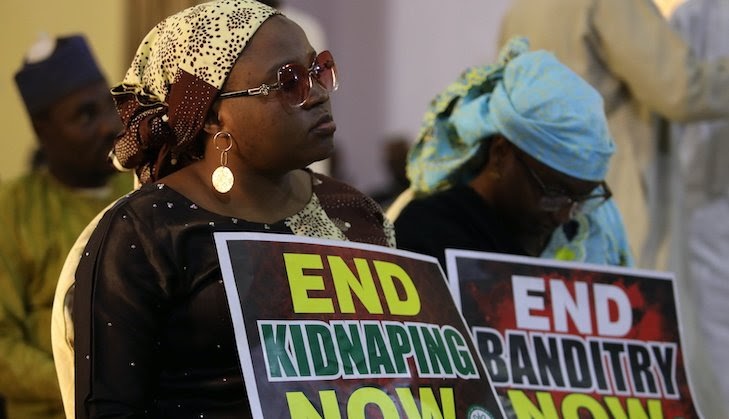Women’s Participation Needed In Nigerian Peace-Building Processes, Experts Say
At an International Women’s Day event, experts discussed the importance of having more women in peace-building processes, especially in de-escalating conflict.

The active participation of women is needed in conflict resolution and peace-building processes in Nigeria, experts have asserted.
The affirmation came on Monday during a webinar by #NGWomen4Peace, an advocacy group that focuses on how insecurity and injustices affect women. The event was held in commemoration of the International Women’s Day celebrated worldwide every March 8.
While giving her presentation, human rights lawyer and legal researcher, Omolara Oriye, noted that it was important to interrogate how conflicts uniquely affect women.
“I am not going to take away agency from women by saying they are always victims of conflict. However, when women are victims of conflict, we definitely experience it in ways that men do not,” Oriye said.
“An important component of a gendered approach to peacebuilding is acknowledging gendered vulnerability and making sure that women and girls are afforded protection from violence. In some cases, our bodies become war territories. In some cases, people use rape and sexual violence as weapons of war.”
She said women who have been victims of sexual violence during armed attacks often face difficulty reintegrating into society, citing the example of people in post-conflict Sierra Leone. It is also tough, she observed, for women in conflict situations to access sanitary aid.
“A truly gendered approach to peace-building and conflict resolution must address not only how men and women experience conflict differently but why… And this means looking at the reasons why women are more vulnerable during conflicts,” Oriye insisted.
Some of these reasons, she explained, include low levels of education, low levels of security, stereotypical norms, gender inequality, and lack of agency.
“Gender equality and the empowerment of women enhances the effectiveness of peace-building and women’s participation are a resource in sustainable development,” she said.
Author and chief executive officer of Naija by Nature, Lesley Agams, noted that women’s involvement in peace processes lead to increased chances of those processes yielding positive results and lamented the exclusion of women in such platforms in different parts of Nigeria.
“Currently, worldwide, the figures for women’s participation in peace processes: Women are only 13 per cent of negotiators, 6 per cent of mediators, and 6 per cent to signatories to peace processes worldwide. And about seven out of every 10 peace processes do not include women mediators and signatories… There’s incredibly slow progress,” she observed.
“What NGWomen4Peace is proposing to do is … to increase, especially at the local government levels, the participation of women in peace processes and also increase their capacity to make demands for such inclusions.”
Okama Brook, an International Development Expert and director of the OXFAM VOICE Innovation and Reconnection Project, agreed that active female participation in peace processes do bring about increased levels of resolution and peaceful co-existence.
“I have seen it in different parts of the world. I was actually involved in the aftermath of the ceasefire agreement in Sri Lanka in 2002, and that was after a protracted conflict between the government and the rebel group there, which killed so many people and devastated the country,” she recalled.
“But when the ceasefire was eventually signed and they had the first President after that, it was a woman, Chandrika Bandaranaike, and the country was able to level up development and protection of the rights of the people.”
Brook also cited examples of women-led or -supported processes in islands belonging to the Kingdom of the Netherlands and some African countries where some levels of normalcy were restored after protracted conflict.
“So really, there is no questioning the role that women can have in peace-building processes if they are given the opportunity. But I often say that opportunities can only be meaningful if they are based on equality,” she said.
She advocated for the development and introduction of policies that support the inclusion of young people and women in governance. She also stressed the need to financially support women so that when they “are brought into peace-building processes, they can uphold themselves while contributing to the dialogue.”
“I think it is critical to have dialogue processes with the insurgent groups. Oftentimes, when people’s voices are silenced, it exacerbates the conflict. We need to look at the root causes of some of these issues and only when we dialogue with the instigators will we know what plans to put in place,” she said.
“On this international women’s day, I call on women to take a leadership role in asking our government to put together a team of negotiators that must have women in it, women who know what they are talking about, and women who can be respected because of what they bring to the table.”
Support Our Journalism
There are millions of ordinary people affected by conflict in Africa whose stories are missing in the mainstream media. HumAngle is determined to tell those challenging and under-reported stories, hoping that the people impacted by these conflicts will find the safety and security they deserve.
To ensure that we continue to provide public service coverage, we have a small favour to ask you. We want you to be part of our journalistic endeavour by contributing a token to us.
Your donation will further promote a robust, free, and independent media.
Donate HereStay Closer To The Stories That Matter




